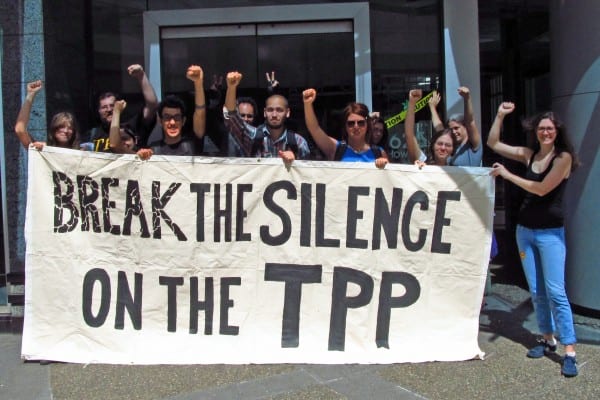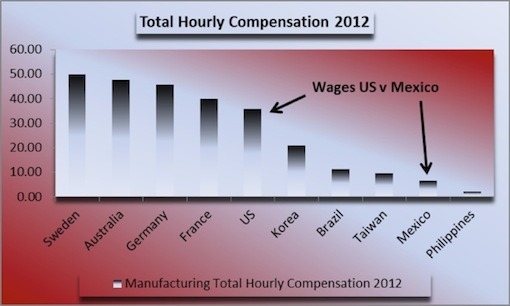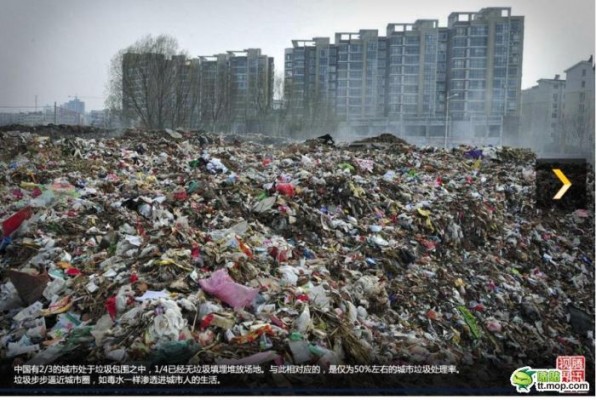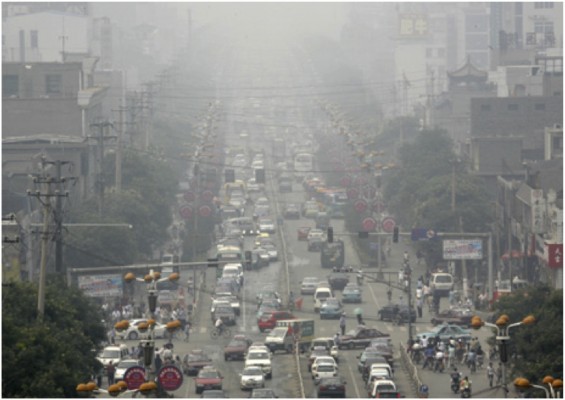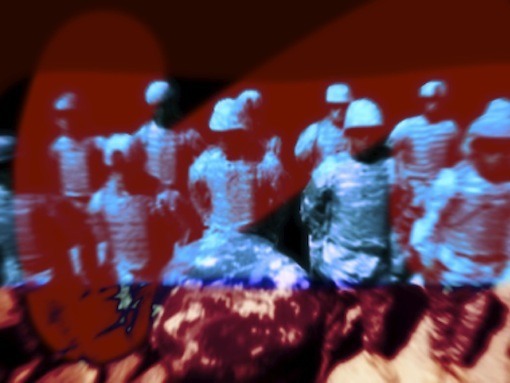The Problem With the TPP is Capitalism
Stuck in an Antique, Suicidal Idiocy
[dropcap]T[/dropcap]wo decades or so ago Scottish philosopher Alisdair MacIntyre made the point that had so much effort not gone into proving the existence of God few people would ever have doubted it. As is currently the case in economics, had ‘free-trade’ not been so wildly oversold much of the economic malpractice attributable to it might not be so easily targetable. As it is, ‘free-trade’ is a slogan, a ‘brand,’ for an opportunistically defined set of social practices and relations. Even with reduced or nonexistent tariffs and trade barriers ‘the economy’ carries with it the residual of historical social relations, standing armies, governments that are political and economic actors on multiple levels and the preponderance of economic acts that never find their way into the economist’s purview.
While the pending TPP (Trans-Pacific Partnership) and TTIP (Trans-Atlantic Trade and Investment Partnership) trade deals have been correctly reported to strengthen intellectual property protections, patents and corporate say over civil governance, (1) a large contingent of mainstream economists and politicians is still invoking free-trade theory to sell the deals and (2) even leftish economists are careful to challenge only these specific aspects of the trade agreements, and not the base premises. Career risk is one reason for not stepping outside of free-trade dogma— economics is amongst the most intellectually constrained of ‘professions.’ And as history has it, the academic mainstream exists to explain the fundamental correctness of existing social relations, not to pose challenges to it.
Graph (1) above: manufacturing wage differences between countries, here including the costs of social insurance, are very large. U.S. wages are lower than those of Scandinavian and major European countries due both to lower direct wages and to lower social insurance benefits. Free-trade theory would have these countries at a major economic disadvantage to the U.S. When adjusted for hours worked, U.S. manufacturing workers are relatively poorly paid. And considering that the value of social insurance is a function of its price, high health care costs and poor outcomes place U.S. wages significantly lower when adjusted for the benefits that are actually delivered. While ‘developed’ Europe is rapidly moving toward ‘liberalization,’ toward the systematic immiseration of its manufacturing workers, residual labor power has slowed the pace relative to that of the U.S. Source: BLS.
A typical rhetorical strategy amongst economists is to isolate the effects of wage differentials on jobs gained or lost despite the fact that few of the corporations likely to outsource look at the world this way. Wages, including the costs of social insurance, are but one factor in the consideration of where to locate manufacturing. The ability to pollute with fewer restrictions (costs) is actually part of the mainstream calculus of the advantages of free-trade— ‘the environment’ is considered a natural ‘endowment’ and the ‘correct’ level of pollution a function of cost-benefit analysis, the trade-off between economic production and environmental destruction. Astute readers will see the formula for collective suicide here: the cost-benefit analysis is done at the national level while the toxic effects of industrial pollution adhere to no such boundaries— no global limit is part of the national calculation.
Picture (1) above: much has been made of the extreme levels of pollution in China while little effort has been made to relate the pollution back to Western consumption of goods manufactured there. Within free-trade theory the question of which country’s cost-benefit analysis Chinese pollution should be charged to comes to bear when U.S. based multinational corporations locate manufacturing in China. With China now the largest emitter of greenhouse gases in the world, the question is: how much less would the West consume if the true costs of Chinese production were forced onto products made there? This cost-benefit shell-game is used to justify free-trade when the facts of pollution are concrete and borne by real human beings.
A consideration related to ‘optimal’ polluting is transportation costs. With manufacturing wages of $3.00 per hour in China and few environmental restrictions the costs of transporting goods long distances to market are a consideration for Western corporations, but not the greenhouse gas emissions that are an uncounted cost of doing so. This ‘transportation’ effect crosses multiple national borders. The costs of polluting fuels can be allocated, but whose ‘costs’ do greenhouse gas emissions fall within in a national cost-benefit analysis? Low wages and toxic pollution are the result of ‘free-trade’ that working class Chinese are seeing from the growth of ‘state’ capitalism.
The ‘free-trade’ view toward labor is similar to that of pollution— there is an ‘optimal’ level of labor power that facilitates capital formation. Independent labor unions don’t exist in China and labor negotiations there tend to be ad hoc, addressing local grievances in place of making institutional changes. Western ‘free-trade’ agreements have made capital mobile while there have been very few efforts to make labor mobile— jobs are mobile, but workers aren’t. This difference illustrates a limitation of capitalist theory. Capital and capitalist products are mobile because they are created to be mobile. Human beings are situated by history, family, community and different languages and customs. To make labor mobile is to take away everything that makes us human.
Graph (2) above: following passage of NAFTA by Democrat Bill Clinton in 1993 the U.S. trade deficit grew and manufacturing employment plummeted. Economist Dean Baker scales manufacturing to broader employment to come to a similar conclusion here. Proponents of current trade deals argue that manufacturing employment was unaffected by NAFTA when a 10-second search for evidence points in the opposite direction. The claim that productivity gains are behind the fall in manufacturing employment requires a method for separating declining manufacturing wages from the calculation of labor output, with additional reference to the Cambridge Capital Controversy. Productivity calculations are capitalist metaphysics of the first order. Source: St. Louis Fed.
With materially lower manufacturing wages in other parts of the world coincident with few restrictions on industrial pollution, a question that must be asked is: why would trade agreements like TPP and TTIP be needed? The ability of corporations to use the ISDS (Investor-State Dispute Settlement) mechanism to challenge environmental and labor restrictions in developed countries suggests that the ultimate goal is to turn the ‘developed’ West into China. And in fact, the business press and elite politicians have spent to last two decades holding China up as a model for Western economic ‘growth.’ That China is “China” because the West is the West seems not to have occurred to these theoreticians of global domination. And in fact, China’s economic model is ‘managed’ capitalism, within the terms given, the polar opposite of ‘free-market’ economics.
Can Western elites really be so dim as to confuse free-market dogma with actual policies? The focus on intellectual property and patent protections in current trade agreements is the antithesis of free-market theories— they are monopoly rights conferred on private corporations. Support for monopoly rights is the basis of the better informed mainstream critiques of current trade deals. This is to argue that even in mainstream terms these aren’t free-trade deals, so the elites pushing them as such are either fools or liars. However, as the last half-century of economic outcomes suggests, the ‘real’ free-trade posed as the alternative requires similar terms for public accedence— catastrophic global warming, dead and dying oceans, Western cities turned into neo-colonial wastelands, global wars for economic resources and remote, self-serving elites whose singular goal is total control.
Picture (2) above: financial capital can be moved around the globe at the push of a button and at the speed of sound but human beings, a/k/a ‘labor,’ have embedded relations, we can’t move freely across national boundaries and face language and cultural barriers to ‘free’ mobility. Here the Texas National Guard is being trained to ‘protect’ the U.S. border with Mexico— in the language of economics, to assure labor immobility. Jobs can be moved around the globe, but jobs aren’t labor, they are the capacity of mobile capital to hire labor. The lot of this embedded labor points to the opportunistic nature of free-trade theories; the premises determine the relevant constituents. Free-trade theory accounts for capital and capitalist ‘goods’ but comes up empty when it comes to actual human beings. The only way that we can be ‘accommodated’ is to become capital. Original image source: blog.chron.com.
[dropcap]T[/dropcap]he Chinese leadership has been relatively open and straightforward about its currency peg to the USD (U.S. dollar). The contrived brouhaha over currency manipulation— the peg that has kept the Chinese currency ‘undervalued’ relative to the USD, is twenty years late. What is likely attractive to U.S. elites is that the Chinese actually have a plan, a mercantilist export strategy that required an undervalued currency to support Chinese exports. The mainstream economists supporting current trade deals do so by spouting antique dogma about ‘comparative advantage’ which is fine with the Chinese— life is easier when your intellectual opponents are willfully blind ideologues. Lest this seem unduly dismissive, the ISDS mechanism, which has nothing to do with comparative advantage, could be removed and mainstream opposition to these trade deals would evaporate.
Picture (3) left: David Ricardo is the de facto senior advisor to the U.S. trade delegation on modern trade theory. Comparative advantage is the argument that if nations do what they do best ‘the economy’ will benefit. That nation-states are historically locatable modes of social organization and that capitalist production ‘works’ by only accounting for its intended products draws a circle around Ricardo’s vision. Put differently, it is hardly incidental that current trade deals seek total control over civil governance to make the economics ‘work.’ Theories developed in ‘independent’ realms require factual independence that the complex interaction of ‘the world’ renders improbable. See Ian Fletcher’s well considered take down of comparative advantage here.
Understanding what Western elites really want from the TPP and TTIP is crucial. President Obama argues that either ‘we’ write the global trade rules going forward or the Chinese will. Point one is that trade rules are not ‘free-trade’ in the sense of an absence of rules— what is being negotiated is ‘managed’ trade. Point two is that the ‘we’ writing the rules are corporate representatives— Bank of America and Monsanto do not represent the public interest and the assertion that they do is profoundly anti-democratic. And despite lip service to the contrary, the ISDS mechanism of these (and past) trade agreements is designed to preclude effective environmental and labor regulations by allowing corporations to sue for wholly imagined ‘lost profits’ that might result from them. In other words, and with apologies to George Orwell, (economic) freedom is slavery.
Implied in Mr. Obama’s view is a unipolar world run by multi-national corporations for their own benefit. Wall Street would be near the top of this food chain— the same Wall Street that got everything it asked for in terms of ‘freedom’ from oversight and regulation and nevertheless killed the global economy in 2008 and exists today on public guarantees, transfers and implied future too-big-to-fail bailouts. U.S. automakers were only able to stay in business through the 1970s and 1980s through massive state intervention— ‘free-marketeer’ Ronald Reagan imposed tariffs and import restrictions that allowed bloated U.S. executives to sell poor quality cars while labor unions were crushed under the interest-rate austerity imposed by Federal Reserve Chairman Paul Volcker. And how profitable would Chevron and Exxon-Mobil be without the murderous, extractive U.S. military to ‘liberate’ oil and gas for them? This is who Mr. Obama today claims should be ‘making the rules’ for the world.
For those who haven’t heard this directly from the mouths of the business theoreticians who birthed it, around two decades ago a group of American business folk, middle aged White guys in suits mostly, developed the theory that America’s ‘comparative advantage,’ what we do best, is ‘management.’ With echoes of the ‘White man’s burden’ American managers, goes the theory, will create a modular economy where ‘we’ tell people, working class Indians, Chinese and Mexicans, what to do and how to do it. Adding clarity of vision, ‘we’ would hire local managers to manage the local workers, local engineers to engineer the production processes, local product designers to design the products and ‘we’ would either hire or locate manufacturing facilities locally. With ‘others’ designing and making products and local managers managing the process, all that was left for ‘us’ to do is to check ‘our’ bank balances to watch the profits accrue.
Yves Smith of nakedcapitalism.com does a slightly more respectful take down of the clever-lite nature of outsourcing ‘theory,’ but the point of current relevance is that Citigroup, General Motors and Monsanto, et al are the chosen players and the antique theoretical anachronism of comparative advantage, with American business ‘leaders’ deciding the terms, is the game that the TPP and TTIP are intended to promote. The ‘intent’ of the ISDS mechanism of superseding civil governance is a function of fitting poorly considered economic theories over the ‘political’ frame of nation-state— Mr. Obama and trade negotiators don’t see it as a capitalist coup because the actual intent is several degrees less sophisticated than the junior high school political theory required to see just how insidious it really is. This isn’t to deny mal-intent. But to the extent it informs these trade agreements, there is more dim tedium than brilliant conspiracy.
Those of us hoping to stick around for a few more decades really might want to change the social trajectory away from this suicidal antique idiocy. What the current arrangement of social circumstance can do— all that it can do, is drop bombs, exacerbate environmental catastrophe and be really mean to poor people. For those of us stuck on the choice between Hillary or Jeb, Democrats or Republicans, what they can do— all that they can do, is drop bombs, exacerbate environmental catastrophe and be really mean to poor people. There is truth in the idea that societies are judged by how we treat the ‘least’ among us, not in some cosmic accounting, but by how we live our lives in the present. From one side the question is: how much crap do ‘we’ really need and from the other, what is the true cost of it and who pays this cost? Vote if you care to, call ‘your’ representatives to vote down trade agreements if you think doing so is useful, but revolution is the solution.
[box] Rob Urie is an artist and political economist. His book Zen Economics will be available in the near future. [/box]
[printfriendly]
Remember: All captions and pullquotes are furnished by the editors, NOT the author(s).
What is $5 a month to support one of the greatest publications on the Left?
